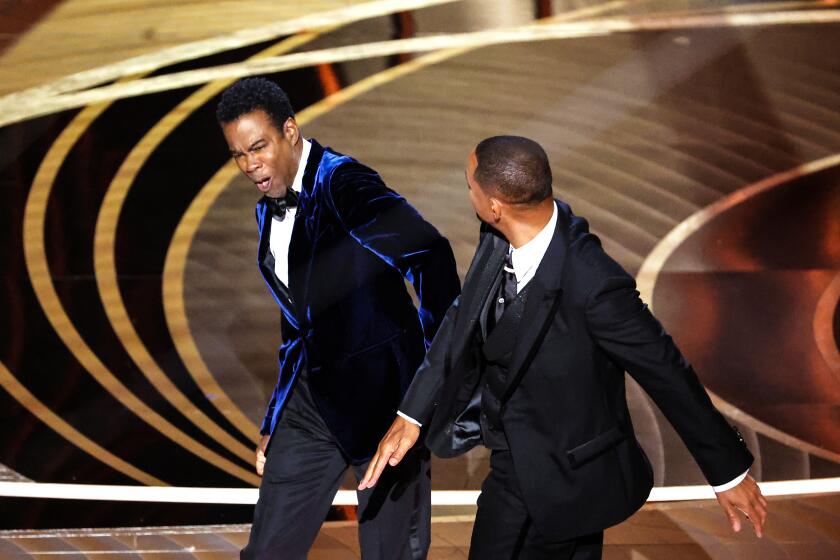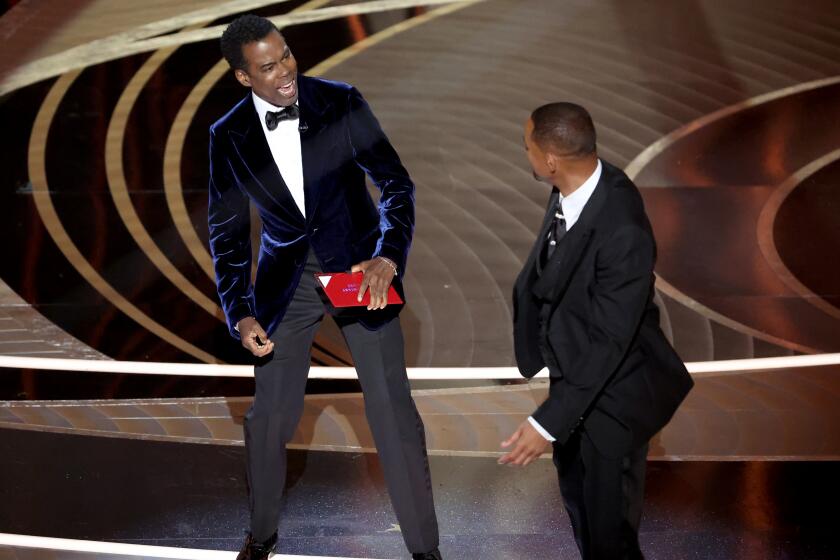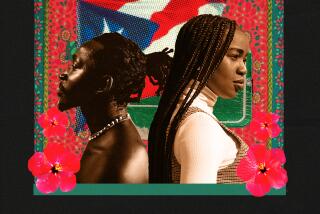Column: Will Smith’s Oscars slap of Chris Rock settles it. We’re done with Black hair jokes
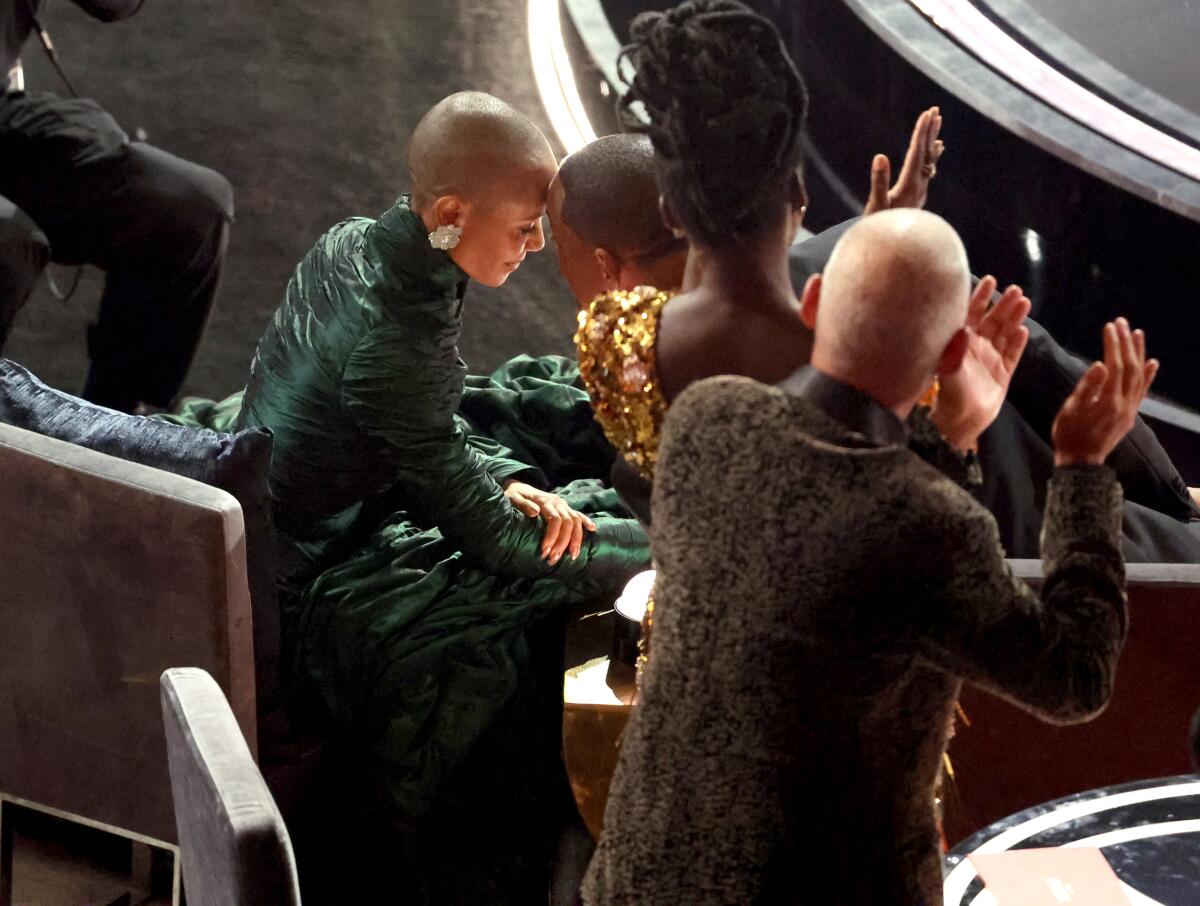
- Share via
Protect Black women.
It’s a dignified mantra that, during the most raucous days of 2020, became an unapologetic command shouted at almost every protest and every march for racial justice in Los Angeles.
It’s also one that Will Smith, a Black man married to a Black woman, took to undignified extremes on Sunday night when he climbed on stage during the Academy Awards and went after comedian Chris Rock for cracking a joke about his wife’s bald hairstyle.
“Will Smith just smacked the s— out of me,” Rock said, as celebrities inside the Dolby Theatre in Hollywood and the rest of us watching TV tried to figure out if what we had just seen was staged. (It wasn’t.)
“Keep my wife’s name out your f— mouth!” Smith shouted at Rock after returning to his seat.
“Wow, dude,” Rock responded, clearly shocked. “It was a ‘G.I. Jane’ joke.”
Yes, Will Smith just slapped Chris Rock at the Academy Awards. No, it wasn’t planned. Here’s how Smith later addressed it.
A few minutes later, as Smith tearfully accepted his first-ever Oscar for leading actor in “King Richard,” chronicling the rise of Compton tennis phenoms Venus and Serena Williams, he took a moment to reflect.
“Richard Williams,” he said of the sisters’ father, whom he portrayed, “was a fierce defender of his family.” Knowing laughter rippled through the audience as Smith cracked a rueful smile.
Smith’s wife, actor Jada Pinkett Smith, revealed in 2018 that she had been diagnosed with alopecia, a medical condition that causes hair loss and often affects Black women. Since then, she has been chronicling the ups and downs of living with it, bravely talking about her bouts of shame and trauma.
“This is going to be a little bit more difficult for me to hide, so I thought I’d just share it so y’all not asking any questions,” Pinkett Smith said in an Instagram post last year, pointing at a bald patch on her scalp. “But you know, mama’s going to put some rhinestones in there, and I’m going to make me a little crown.”
We may never know exactly why Rock’s joke was enough to make Smith — an actor generally known for his affability, not his irritability — snap so violently during a live television broadcast.
He was right to apologize to the Academy of Motion Picture Arts and Sciences and his fellow nominees for his inappropriately caveman-like behavior. He did so during his acceptance speech on Sunday night and again on Instagram on Monday afternoon.
“I am embarrassed and my actions were not indicative of the man I want to be. There is no place for violence in a world of love and kindness,” Smith wrote, adding: “Jokes at my expense are a part of the job, but a joke about Jada’s medical condition was too much for me to bear and I reacted emotionally.”
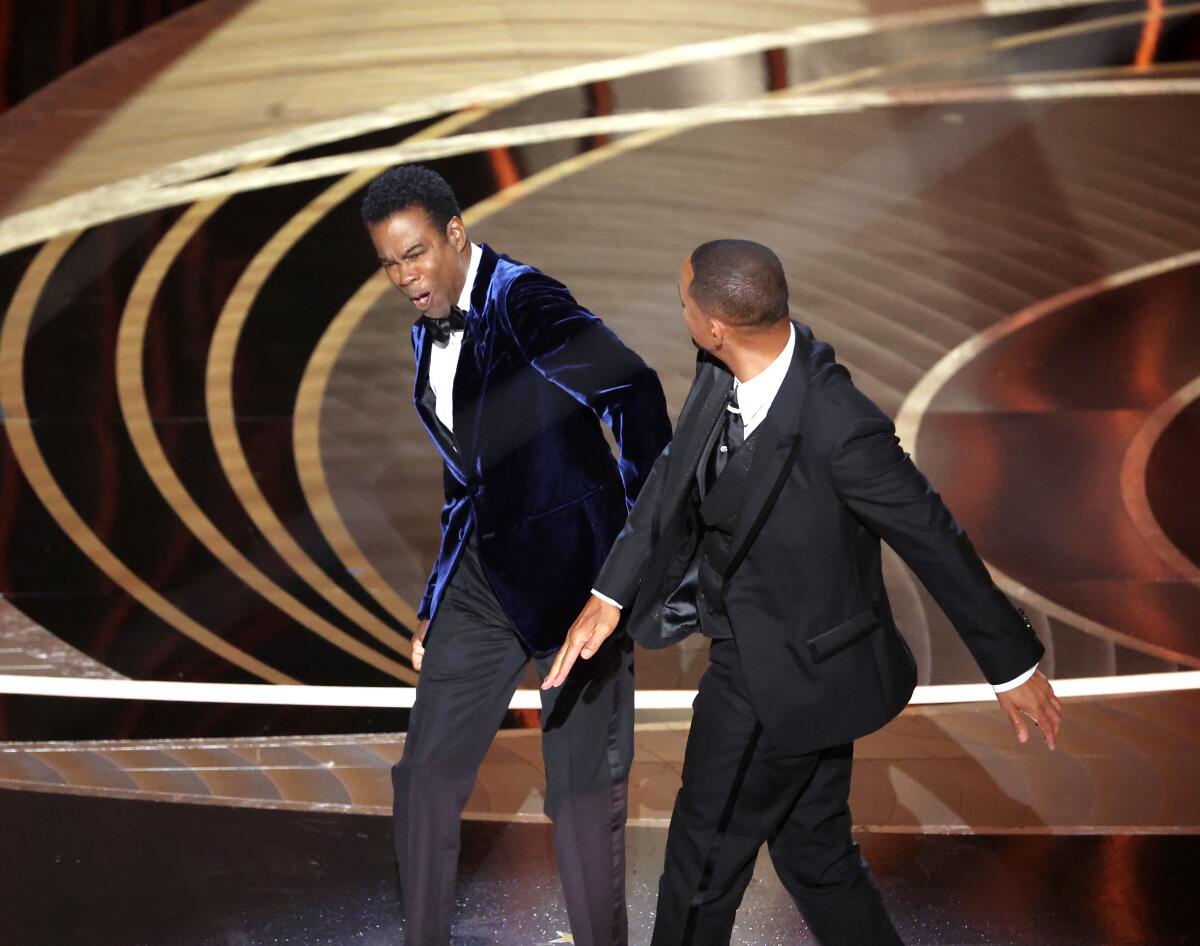
Indeed. Although the slap was “inexcusable,” as Smith put it, his instinct to protect Black women — to protect his Black wife from humiliation — also was absolutely understandable. Our hair, a particular point of vulnerability even for those of us without alopecia, is not something to be mocked.
Rock, of all people, should know this.
In 2009, he narrated the documentary film “Good Hair,” supposedly inspired by his young daughter who asked him one day: “Daddy, how come I don’t have good hair?” In other words, she has the coarse, kinky curls that most Black people do. Not the waves or straight hair that, for so many centuries in the United States, has been considered what is beautiful.
The film expertly digs into the expensive and often harmful hoops that Black women go through to conform to what are essentially white standards of beauty. Many of us are taught as children — thankfully less so these days — that the closer you are to approximating whiteness in all of its forms, the more successful you are likely to be. And society reinforces this on the daily.
It all serves to create a deep sense of self-loathing that can be hard to get rid of, even for adults who are hellbent on self-acceptance.
Just moments after slapping presenter Chris Rock hard on live television, Will Smith found himself in tears as he gave his acceptance speech for winning the Oscar for best actor for his performance in “King Richard.”
This is why, just this month, the U.S. House passed the CROWN Act, which prohibits discrimination against Black and brown people in workplaces and schools for wearing natural hairstyles. It is based on a California law that Los Angeles County Supervisor Holly Mitchell was author of when she was a member of the state Senate.
Among the sponsors for the federal bill is Rep. Ayanna Pressley, a Democrat from Massachusetts who also has been outspoken about her own diagnosis with alopecia.
“Black girls, with our braids, locs, afros, all forms of natural hairstyles and yes, even our smooth Alopecian bald heads, belong everywhere,” she said from the floor at the U.S. Capitol. “For too long, Black girls have been discriminated against and criminalized for the hair that grows on our heads and the way we move through and show up in this world.”
Other Black women in the House chimed in with their own stories. As a Black woman with a natural hairstyle of sisterlocks, I have my own.
Indeed, this is why Mitchell proposed the bill in California in the first place. She wanted to help dispel myths about Black hair and redefine what constitutes “professionalism” in the workplace.
“Eurocentric standards of beauty have established the very underpinnings of what was acceptable and attractive in the media, in academic settings and in the workplace,” Mitchell, who wears her hair in sisterlocks, told The Times in 2019. “So even though African Americans were no longer explicitly excluded from the workplace, Black features and mannerisms remained unacceptable.”
And this is why it was so meaningful to watch Judge Ketanji Brown Jackson, not only skillfully navigate a bunch of bloviating Republican senators during her confirmation hearings for the U.S. Supreme Court last week, but do so wearing sisterlocks.
Jackson’s refusal to straighten her hair to meet white beauty standards is redefining what a Black woman must look like to be successful, even in the conservative halls of the federal government.
Whoopi Goldberg, Mark Hamill and Jameela Jamil are among the celebs weighing in on Will Smith attacking Chris Rock at the Oscars. And there’s no consensus.
For Black women, this is the backdrop for what happened Sunday night in Hollywood. It’s one reason why so many were quick to defend Smith — or, at the very least, empathize with why he did what he did.
Pressley, for instance, tweeted: “Thank you #WillSmith Shout out to all the husbands who defend their wives living with alopecia in the face of daily ignorance & insults.”
She apparently thought better of it, though, and deleted the tweet.
On Monday, she instead tweeted an appreciation post for those who “hold us down & support us” during the most difficult days of living with alopecia.
“Our bodies are not public domain. They are not a line in a joke — especially when the transformation is not of our choosing. I’m a survivor of violence. I’m a proud Alopecian. The psychological toll we carry daily is real. Team Jada always.”
If we remember anything from the so-called slap heard around the world, let’s remember that.
More to Read
Sign up for Essential California
The most important California stories and recommendations in your inbox every morning.
You may occasionally receive promotional content from the Los Angeles Times.

